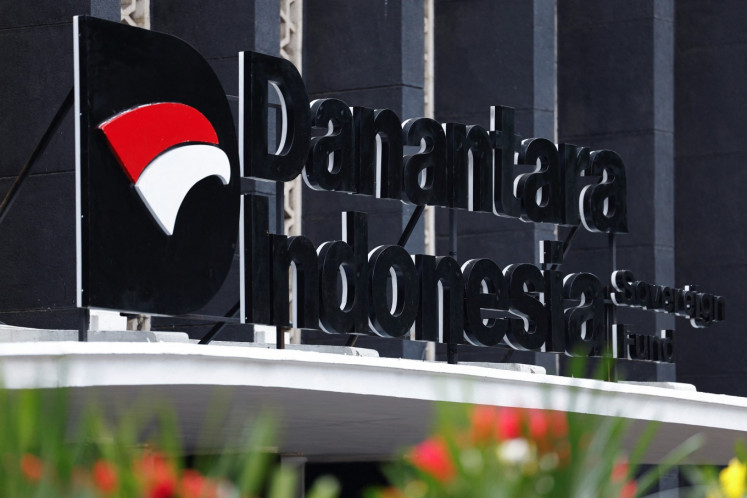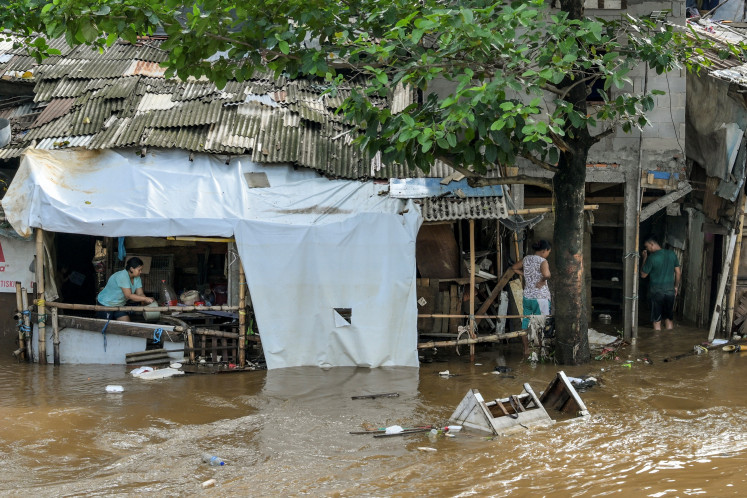Popular Reads
Top Results
Can't find what you're looking for?
View all search resultsPopular Reads
Top Results
Can't find what you're looking for?
View all search resultsInflation and fuel subsidy cuts amid oil price hikes
The year 2011 has brought an interesting challenge for the Indonesian economy in the form of inflation or price increases of aggregate goods
Change text size
Gift Premium Articles
to Anyone
T
he year 2011 has brought an interesting challenge for the Indonesian economy in the form of inflation or price increases of aggregate goods.
One major indicator for this challenge is the rise of the Bank Indonesia (BI) rate from 6.5 percent to 6.75 percent in early February. This was the first change of the BI rate since August 2009 and also gives us signals that in 2011 the central bank has started to beat the drums of war against inflation.
After a quick recovery from the global economic crisis in 2008, Indonesia has enjoyed an impressive economic growth of 4.9 percent in 2009 and 6.0 percent in 2010.
However the inflation rate rose much faster from 2.78 percent in 2009 to 6.96 percent in 2010. In January 2011 alone, inflation stood at 0.89 percent due to an extraordinary increase in agriculture products such as rice and chili.
Therefore, it seems reasonable that BI, as the guardian of macro and monetary stability, has started
to feel inflationary pressures and initiated a tight monetary policy characterized by an increase of the BI rate.
Another issue in the near future to worry about is the impact of the revolution that occurred in North African countries and the Middle East, which are well known as oil producing countries. Political instability in those regions can trigger volatility in world oil prices.
In fact, the price has passed the psychological level of US$100 per barrel at the end of February. This rise in world oil prices and low national oil production will always be an important factor pushing the government to formulate good policies, which includes reduction of the fuel subsidy from budget.
Actually the government already has a plan to reduce energy subsidies, including oil and electricity by 10-15 percent per year until the year 2014. This scheme includes the elimination of the entire subsidy in that year.
Although based on the report of OECD Economic Survey on Indonesia in 2010, the government
applies a fuel subsidy to help the poor so that they can meet their basic needs.
However, high fuel subsidies will disrupt the signal of changes in prices and may cause uncertainty in investment decision making.
Moreover, it will reduce the government’s fiscal ability to finance development activities because if the world fuel price exceeds the assumption in the state budget, the government will have to cover the price margin.
The other problem is, if the government maintains the fuel price at a low level this will encourage people to consume more and more fuel.
It will also reduce the incentive to improve efficiency in energy use or research and utilization of other alternative energy sources. In addition, this subsidy is misplaced because in fact the cheap fuel price is enjoyed by consumers from the middle and upper classes.
In the end we must realize that the increase in the world oil price will force the government to reduce fuel subsidies. But after that happens the government will have to face a period of adjustment that brings two important kinds of homework.
The first issue pertains to the threat of a slow-down of macro-economic performance. History shows that every time the government cuts the fuel subsidy, economic growth slowed.
For example, in October 2005 when the price of premium gasoline rose by 87.5 percent from Rp 2,400 per liter to Rp 4,500 per liter as a result of the subsidy reduction, the country’s economy grew 5.13 percent, lower than the 2006 and 2007 mark of more than 6.0 percent. This occurred because the increase in fuel prices triggered inflation, and especially a rise of production and distribution costs.
After the fuel price rises, the producers could not immediately raise their goods price. They wanted their consumers to continue buying their products even after the fuel price increase.
So the wisest choice for entrepreneurs was to cut the number of goods they produced while recalculating the cost of production and planning to increase the price of their products in the next period.
In the worse case, it may also be possible to lay off some of their employees to reduce pressure on production costs, which means fuel price hikes can lead to unemployment.
To deal with these problems, the government needs to think about strategic steps to shore up both the production of major industrial sectors such as steel, cement and mining as well as in the informal sector such as farming, fishery and also small and medium enterprises.
Loans with soft credit rates and simple processes or tax incentives can help entrepreneurs maintain production without having to lay off their employees.
The second homework which is also the most important task for governments is to maintain the purchasing power of the people, especially the poor.
It is advisable that the government implement policies that compensate for the decline of the real income of the poorest communities and prevent the poverty rate increase in Indonesia.
Referring to the past experience, direct cash assistance for the community is an example of a policy that can be well accepted by poor people, and has a proven capacity to reduce the economic turmoil due to a reduction in fuel subsidies. This policy is also practically effective, because the cost can be measured by the government.
These two government policy packages, which compensate for the increase in production costs and also maintain people purchasing power, should be implemented simultaneously with continuous evaluations, so that they can reduce other problems that arise after fuel subsidies are lifted.
The formulation of appropriate policies becomes more important if the government delays adjusting the world oil price in the state budget.
Nobody wants to see the cost of subsidizing fuel prices rise more than the formulation of the policies either.
This subsidy is misplaced because in fact the cheap fuel price is enjoyed by consumers from the middle and upper classes.
The writer is pursuing a Master’s degree in economics at Universite Paris 1, Pantheon-Sorbonne.










